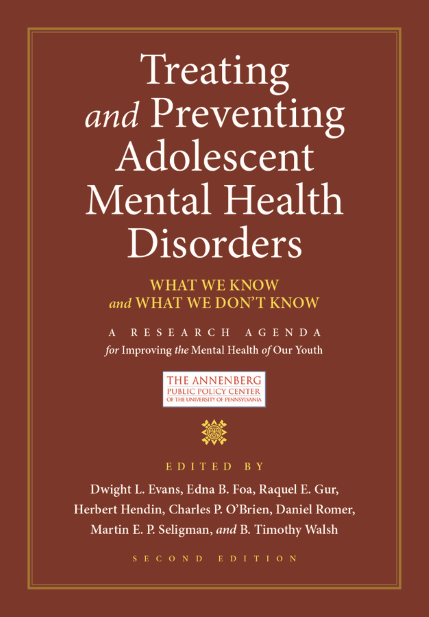“Treating and Preventing Adolescent Mental Health Disorders: What We Know and What We Don’t Know,” an overview of adolescent mental health disorders that was updated and published in a new hardcover edition last year, is now available online as a free e-book.
The e-book is available on the Oxford University Press website, where individual chapters can be downloaded in PDF format.

The volume is the work of seven commissions that pooled their expertise for the Adolescent Mental Health Initiative, which was convened by the Annenberg Public Policy Center and the Annenberg Foundation Trust at Sunnylands. The initiative, launched in 2003, involved six groups that examined mental health disorders including anxiety disorders, schizophrenia, depression and bipolar disorder, eating disorders, substance and alcohol abuse, and suicide prevention, while the seventh commission examined positive youth development.
The book was released in a free electronic edition courtesy of Oxford University Press and the Annenberg Public Policy Center. The policy center said, “We want this book to be available to the largest possible readership and ensure that researchers and mental health practitioners gain access to the most up-to-date information for the diagnosis, treatment and research regarding these adolescent disorders.”
Published in hardcover in 2017, the second edition (announced here) incorporates changes in the DSM-5 diagnostic criteria and includes new chapters on gambling and excessive internet use. In the Introduction, B. Timothy Walsh, M.D., said those new areas “reflect an emerging interest in ‘behavioral addictions,’ patterns of behavior that bear strong similarities to substance use disorders (e.g., persistent and excessive time committed to the behaviors, leading to interference with other activities; reluctance to disclose the level of involvement to others, including parents).”
Upon the publication of the second edition, co-editor Daniel Romer, Ph.D., the research director of the Annenberg Public Policy Center, said the volume “highlights the gaps in our understanding and the challenges that lie ahead in adequately promoting adolescent mental health.” Kathleen Hall Jamieson, director of the Annenberg Public Policy Center and program director of the Annenberg Foundation Trust at Sunnylands, said, “We hope this updated volume continues to fulfill our aim of informing practitioners and researchers of the successes achieved and the challenges that remain in ensuring the well-being and health of the nation’s youth.”
The Adolescent Mental Health Initiative is also responsible for producing a series of accessible, supportive guides for parents and adolescents dealing with various mental health disorders. The latest in the series for parents, “If Your Adolescent Has ADHD,” was published in August and is available from Oxford University Press. Prior books in the series — which includes four others for parents and eight written for adolescents — are available as free downloadable PDFs on the APPC website. The books for adolescents include specific volumes on obsessive-compulsive disorder, social anxiety disorder, bipolar disorder, depression and suicide.


